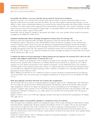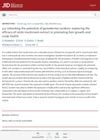1 citations,
October 1996 in “Dermatologic clinics” Adiponectin reduces inflammation and bone loss in joint replacements.
July 2024 in “Journal of Controlled Release” Nanostructured lipid carriers effectively deliver tofacitinib to hair follicles, reversing hair loss in alopecia areata.

Problems with arginine processing in hair follicles might contribute to common hair loss, and arginine supplements could help treat it.
 October 2023 in “Current Issues in Molecular Biology”
October 2023 in “Current Issues in Molecular Biology” The YH complex, made from Astragalus membranaceus and Cinnamomum cassia, may help treat hair loss by promoting hair growth and follicle development.
 May 2023 in “Journal of Investigative Dermatology”
May 2023 in “Journal of Investigative Dermatology” Blocking DPP4 can potentially speed up hair growth and regeneration, especially after injury or in cases of hair loss.
 January 2023 in “Theranostics”
January 2023 in “Theranostics” A patch with curcumin-zinc can improve hair growth and health by delivering beneficial particles to the skin, increasing hair follicles, and reversing effects of a hair loss hormone.
 December 2022 in “Frontiers in Pharmacology”
December 2022 in “Frontiers in Pharmacology” Tianma Gouteng decoction may help prevent hair loss and promote hair growth.
 August 2010 in “Journal of Investigative Dermatology”
August 2010 in “Journal of Investigative Dermatology” New hair regrowth model introduced, imiquimod kills skin cancer cells, T-cadherin loss makes skin cancer more invasive, no strong link between PTCH1 gene and skin cancer after transplant, and male teens more likely to have hereditary hair loss.
 July 2010 in “British Journal of Dermatology”
July 2010 in “British Journal of Dermatology” New hair regrowth model proposed, imiquimod found to kill skin cancer cells, T-cadherin loss linked to invasive skin cancer, no clear gene link to skin cancer after transplant, and study on children's hair loss shows male dominance and genetic ties.
 July 2022 in “The journal of investigative dermatology/Journal of investigative dermatology”
July 2022 in “The journal of investigative dermatology/Journal of investigative dermatology” Exosome therapy shows promise for hair loss but needs more research on safety and effectiveness.
 12 citations,
July 2014 in “Journal of Investigative Dermatology”
12 citations,
July 2014 in “Journal of Investigative Dermatology” Chemotherapy causes complex changes in hair follicle cells that can lead to hair loss.
9 citations,
February 2020 in “Journal of Cosmetic Dermatology” Pulsatilla chinensis compounds may help prevent stress-related hair loss.
 January 2025 in “bioRxiv (Cold Spring Harbor Laboratory)”
January 2025 in “bioRxiv (Cold Spring Harbor Laboratory)” Potential therapeutic targets for scarring hair loss are identified.
 November 2008 in “Medical & surgical dermatology”
November 2008 in “Medical & surgical dermatology” A device was made in 2008 to measure hair loss severity. Other findings include: frizzy mutation in mice isn't related to Fgfr2, C/EBPx marks preadipocytes, Cyclosporin A speeds up hair growth in mice, blocking plasmin and metalloproteinases hinders healing, hyperbaric oxygen helps ischemic wound healing, amniotic membranes heal wounds better than polyurethane foam, rhVEGF165 from a fibrin matrix improves tissue flap viability and induces VEGF-R2 expression, and bFGF enhances wound healing and reduces scarring in rabbits.
February 2023 in “PLOS ONE” Caizhixuan hair tonic helps treat hair loss by promoting hair growth and improving hair follicles.
 22 citations,
October 2018 in “Aesthetic Plastic Surgery”
22 citations,
October 2018 in “Aesthetic Plastic Surgery” Understanding hair follicle biology and stem cell control could lead to new hair loss treatments.
20 citations,
February 2018 in “Cell transplantation” Cinnamomum osmophloeum leaf extract may help treat hair loss by promoting hair growth and increasing hair cell proliferation.
 3 citations,
May 2023 in “International Journal of Molecular Sciences”
3 citations,
May 2023 in “International Journal of Molecular Sciences” A new treatment using nanoparticles can effectively prevent and reduce hair loss caused by chemotherapy.
 November 2024 in “Journal of Investigative Dermatology”
November 2024 in “Journal of Investigative Dermatology” Reishi mushroom extract may help treat hair loss.
 April 2024 in “Journal of ethnopharmacology”
April 2024 in “Journal of ethnopharmacology” Ellagic acid may help regrow hair and prevent hair loss by activating a specific cell growth pathway.

Qu-shi-yu-fa Decoction may help treat hair loss by promoting hair growth and strengthening hair follicles.
April 2019 in “The journal of investigative dermatology/Journal of investigative dermatology” Blocking JAK1 or JAK3 helps reverse hair loss in a mouse model of alopecia areata.
October 2015 in “CRC Press eBooks” Hair cloning for hair loss is not yet a practical solution.
 185 citations,
August 2005 in “Autoimmunity Reviews”
185 citations,
August 2005 in “Autoimmunity Reviews” Alopecia areata is an autoimmune condition causing hair loss due to the immune system attacking hair follicles, often influenced by genetics and stress.
 80 citations,
April 2018 in “Trends in Molecular Medicine”
80 citations,
April 2018 in “Trends in Molecular Medicine” Lichen Planopilaris and Frontal Fibrosing Alopecia may help us understand hair follicle stem cell disorders and suggest new treatments.
57 citations,
October 1996 in “Dermatologic clinics” HA-MNs with MXD effectively treat hair loss better than topical MXD with fewer side effects.
 30 citations,
May 2018 in “Experimental Dermatology”
30 citations,
May 2018 in “Experimental Dermatology” The conclusion is that future hair loss treatments should target the root causes of hair thinning, not just promote hair growth.
 13 citations,
December 2011 in “Korean Journal of Food Science and Technology”
13 citations,
December 2011 in “Korean Journal of Food Science and Technology” Black soybean extract helps promote hair growth and could prevent hair loss.
1 citations,
January 2014 Biochanin A promotes hair growth in mice with testosterone-induced hair loss.
December 2024 in “International Journal of Molecular Sciences” Targeting CXCL12 may help treat hair loss caused by androgens.



















